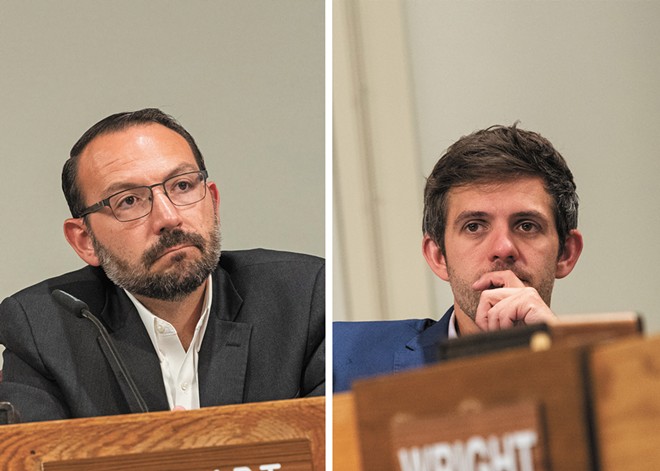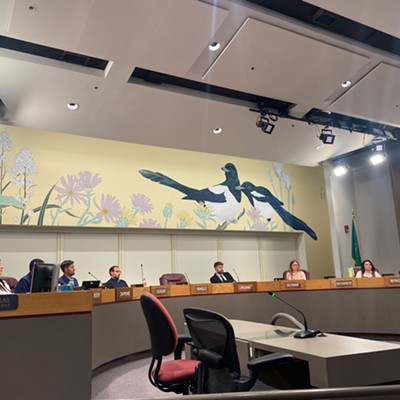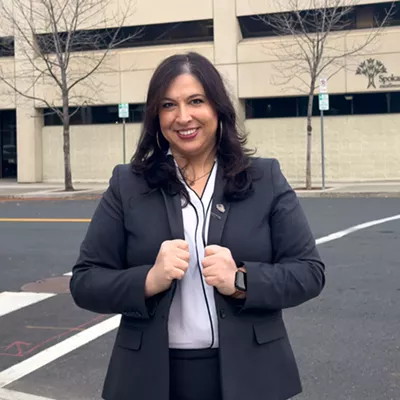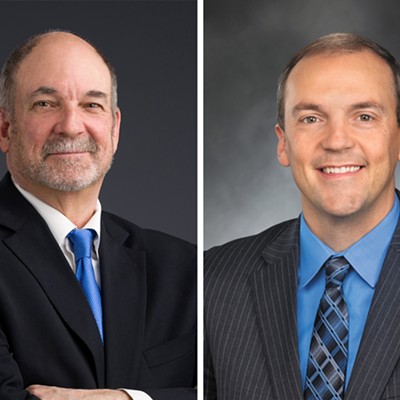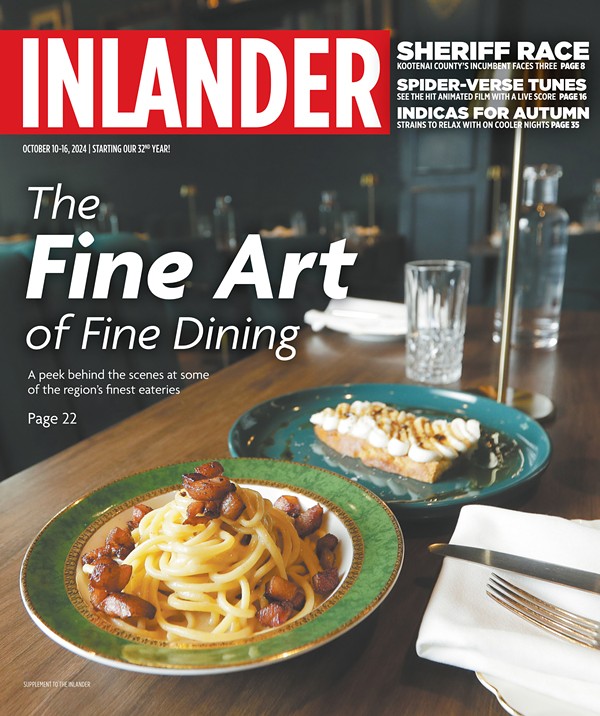In February, Spokane voters will consider a ballot measure that would change the way City Council districts are drawn and — ideally — remove City Council influence and perceptions of partisanship from the process.
The ballot measure was prompted by last year's redistricting process — a contentious affair that resulted in a legal battle, ethics complaints and accusations that Council member Zack Zappone had gerrymandered his own district by pushing a map that makes it easier for liberal candidates (like Zappone) to win.
Zappone insists he didn't do anything wrong. He notes that Spokane County Superior Court Judge Tony Hazel ruled this spring that the map pushed by Zappone didn't violate the law. Hazel also said that Zappone seems to have been aware of the partisan implications of his map and that council members shouldn't be involved in the process going forward.
The new ballot measure — called "Measure 2" — aims to prevent a repeat of the redistricting fiasco.
City Council members unanimously voted last week to send the proposed changes to voters. The new proposal modifies an earlier ballot measure introduced by City Council member Michael Cathcart this summer, and is the result of compromise between progressive and conservative council members.
"These changes are reasonable," Cathcart said before Thursday's vote. "I think they represent a good common ground."
Zappone says he hopes the unified support will show voters that the proposed changes to the redistricting process are intended to fix a broken system — not benefit a specific political party.
Several hours after Thursday's vote, Zappone appeared in front of the city's Ethics Commission for the final hearing in a complaint filed over his actions during the redistricting process.
The complaint was filed by Neil Muller, a local insurance sales executive who alleged that Zappone had "acted in a manner that is irresponsible, untrustworthy, without integrity, untruthful, dishonest, unfair, improper" and had used his office and city resources for personal gain.
After a lengthy hearing, the Ethics Commission came to a split vote.
Two members believed Zappone had violated city code by using the redistricting process to benefit himself politically. Two other members disagreed. With three vacancies, the normally seven-person commission was deadlocked.
Zappone says he had hoped for a more decisive answer, but that he still thinks it's clear he didn't commit an ethics violation. He hopes that Thursday's ethics hearing — and the council's collaboration on the new ballot measure — will help finally put the redistricting controversy to rest.
"We can move past this and hopefully work together," Zappone says.
City Council district boundaries are updated every decade to account for changes in population. Last year, the process was driven by a Redistricting Commission composed of three appointed volunteers. Zappone and then-Council President Breean Beggs served as advisory members.
The volunteer members drew up more than a dozen maps that aimed to balance the competing goals of keeping populations mostly equal, following geographic boundaries when possible and keeping neighborhoods intact.
Zappone also drew a map of his own and presented it to the board. Despite the Redistricting Commission's recommendation that City Council adopt a map drawn by one of its members, the City Council voted 4-2 to adopt the one drafted by Zappone. Cathcart and fellow conservative Jonathan Bingle were opposed. Zappone, conscious of the brewing controversy, abstained.
Zappone has insisted that the map he drafted only aimed to unify neighborhoods and meet other redistricting requirements.
The map does avoid dividing neighborhoods, but it also moves the reliably liberal Browne's Addition neighborhood into northwest Spokane's District 3, giving progressive candidates like Zappone a small but not-insignificant advantage. It also makes northwest Spokane's District 1 more friendly to liberals.
In the wake of the controversy, Cathcart introduced a charter amendment that aimed to limit the City Council's involvement in future redistricting processes.
The charter amendment would expand the volunteer Redistricting Commission from three members to seven. Three would be appointed by the mayor, three would be appointed by council. The seventh would be a nonvoting chairperson appointed by members of the commission.
The charter amendment would also create a process for residents to request a redistricting in the middle of the decade and restricts the City Council from choosing a map that wasn't recommended by commission. If council members couldn't agree, the commission would have to go back to the drawing board and create a new one.
In July, the City Council voted unanimously to put the proposed changes on the ballot. Months later, in early December, Zappone proposed withdrawing Cathcart's measure and instead considering the redistricting changes as part of a larger, community-driven review of the entire city charter.
Zappone agreed that the redistricting process needed fixing, but he argued that Cathcart's ballot measure didn't actually have bipartisan support, as Zappone and two other council members had been absent during the July vote. Zappone also said there hadn't been sufficient community input, and that the city was overdue for a charter review anyway.
Cathcart and Bingle pushed back. Council members voted to put the measure on the ballot months ago, they said, why restart the debate now?
Unable to agree, council members decided to defer the vote to Dec. 14 — just one day before the deadline to make changes to the February ballot.
"I just fear we're going to have a rehash of a partisan fight," Zappone said.
Zappone's fears turned out to be unfounded. City Council members were able to agree and unanimously pass a new version of the measure.
The new version that will appear on the February ballot encourages the mayor and City Council to appoint people with demographic and geographic diversity in mind, and stipulates that preventing the breakup of neighborhoods is a priority. If the City Council can't agree on the map the commission recommends, a municipal court judge steps in.
The ethics complaint filed against Zappone relied heavily on text messages subpoenaed as part of the Superior Court lawsuit, which show Zappone coordinating messaging strategies and discussing how the new map would benefit progressives.
Newly elected City Council member Paul Dillon, a longtime progressive activist who briefly pops up in the subpoenaed messages between Zappone and his political allies, helped gather community feedback on the new version of the ballot measure that the City Council approved Thursday.
Dillon says there are some aspects of the measure — like the mayor having equal say with the City Council — that he wishes were different. But overall, he says the new version sends a "powerful, unified message."
Dillon, who also stopped by Zappone's ethics hearing on Thursday to listen and show support, says redistricting will always be a contentious process. But he hopes the charter amendment will help ease some of the tensions.
"This should instill more confidence in voters," Dillon says. "People do not expect us to play games with democracy." ♦

